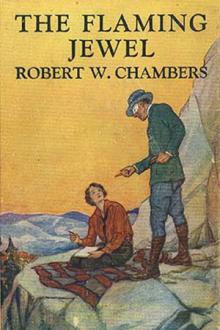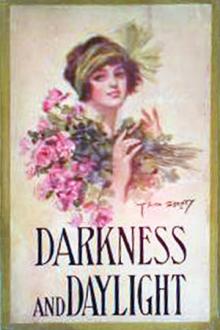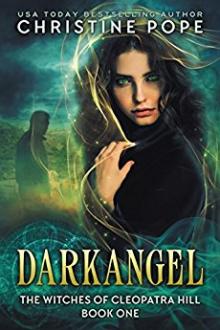Genre Romance. Page - 14

laugh from without seemed to answer my unasked question in the negative.
But as well as the laugh I heard another sound--the tones of a sweet sad voice in despair coming across the room.
"Oh, alone, alone! is there no human thing near me? No hope--no hope. I shall go mad--or die."
The last words were spoken with a gasp.
I tried to jump out of bed, but could not stir, my limbs were bound in sleep. The young girl's head fell suddenly back upon the pillow, and the limp-hanging jaw and wide-open, purposeless mouth spoke but too plainly of what had happened.
Again I heard from without the fierce, diabolical laughter, which swelled louder and louder, till at last it grew so strong that in very horror I shook aside my sleep and sat up in bed. listened and heard a knocking at the door, but in another moment I became more awake, and knew that the sound came from the hall. It was, no doubt, Mr. Trevor returning from his party.
The hall-door was opened and shut, and then came a

ess worse than death.Recognizing, therefore, that in this cultivated age a wall ofscepticism and cynicism is gradually being built up by intellectualthinkers of every nation against all that treats of the Supernaturaland Unseen, I am aware that my narration of the events I haverecently experienced will be read with incredulity. At a time whenthe great empire of the Christian Religion is being assailed, orpolitely ignored by governments and public speakers and teachers, Irealize to the fullest extent how daring is any attempt to prove,even by a plain history of strange occurrences happening to one'sself, the actual existence of the Supernatural around us; and theabsolute certainty of a future state of being, after the passagethrough that brief soul-torpor in which the body perishes, known tous as Death.
In the present narration, which I have purposely called a "romance,"I do not expect to be believed, as I can only relate what I myselfhave experienced. I know that men and women of to-day must

st she see the deep red flood of shame which had suffused his face. Poor little skinny, homely, orphan kid, thrown out to buck the world for herself, and stopping in her first flight from injustice to help a stranger, only to have him think her a possible criminal! He was glad that his back twinged and his head throbbed; he ought to be kicked out into the ditch and left to die there for harboring such thoughts.
He was a cur, and she--hang it! There was something appealing about her in spite of her looks. Perhaps it was the sturdy self-reliance, which in itself betrayed her utter innocence and ignorance of the world, that made a fellow want to protect her.
In his own circle James Botts had never been known as a Sir Galahad, but he had been away from his own circle for exactly nineteen eventful days now, and in that space of time he had learned much. His heart went out in sympathy as he turned once more to her.
But at the moment Lou Lacey seemed in no momentary need of sympathetic

d by no means avoided her noble relatives, nor did she at all avoid Alice Vavasor. When in London she was persevering in her visits to Queen Anne Street, though she considered herself, nobody knew why, not to be on speaking terms with Mr Vavasor. And she strove hard to produce an intimacy between Alice and her noble relatives--such an intimacy as that which she herself enjoyed;--an intimacy which gave her a footing in their houses but no footing in their hearts, or even in their habits. But all this Alice declined with as much consistency as she did those other struggles which her old cousin made on her behalf,--strong, never-flagging, but ever-failing efforts to induce the girl to go to such places of worship as Lady Macleod herself frequented.
A few words must be said as to Alice Vavasor's person; one fact also must be told, and then, I believe, I may start upon my story. As regards her character, I will leave it to be read in the story itself. The reader already knows that she appears upon the scene

any young girl can stomach the life at Clinch's."
"It's a wonder what a decent woman will stand," observed Stormont. "Ninety-nine per cent. of all wives ought to receive the D. S. O."
"Do you think we're so rotten?" inquired Lannis, smiling.
"Not so rotten. No. But any man knows what men are. And it's a wonder women stick to us when they learn."
They laughed. Lannis glanced at his watch again.
"Well," he said, "I don't believe anybody has tipped off our man. It's noon. Come on to dinner, Jack."
They cantered forward into the sunlit clearing. Star Pond lay ahead. On its edge stood Clinch's.
III
Clinch, in his shirt sleeves, came out on the veranda. He had little light grey eyes, close-clipped grey hair, and was clean shaven.
"How are you, Clinch," inquired Lannis affably.
"All right," replied Clinch; "you're the same, I hope."
"Trooper Stormont, Mr. Clinch," said Lannis in his genial way.
"Pleased to know you," said Clinch, le

ir Thomas was ill at the time, and his wife couldn't leave him. She had to send the child to England, and who should she send her to but me? Look at her now, and say if the English air hasn't agreed with her! We two mothers, Mr. Kendrew, seem literally to live again in our children. I have an only child. My friend has an only child. My daughter is little Anne--as I was. My friend's daughter is little Blanche--as she was. And, to crown it all, those two girls have taken the same fancy to each other which we took to each other in the by-gone days at school. One has often heard of hereditary hatred. Is there such a thing as hereditary love as well?"
Before the guest could answer, his attention was claimed by the master of the house.
"Kendrew," said Mr. Vanborough, "when you have had enough of domestic sentiment, suppose you take a glass of wine?"
The words were spoken with undisguised contempt of tone and manner. Mrs. Vanborough's color rose. She waited, and controlled the

perchance to hear again that mirthful, happy laugh.
Then game a gust of wind, the sun retreated, the soldiers gasped, and lo! before Mr. Inch or Mr. Corporal had realized that the picture was made of flesh and blood, horse and rider has disappeared, there, far out across the Heath, beyond the gorse and bramble and the budding heather, with not a handful of dusk to mark the way they went.
Only once from far, very far, almost from fairyland, there came, like the echo of a sliver bell, the sound of that mad, merry laugh.
"Beau Brocade, as I live!" murmured Mr. Inch, under his breath.
Chapter II
The Forge of John Stich
John Stich too had heard that laugh; for a moment he paused in his work, straightened his broad back and leant his heavy hammer upon the anvil, whilst a pleasant smile lit up his bronzed and rugged countenance.
"There goes the Captain," he said, "I wonder now what's tickling him. Ah!" he ad

cook, who on all occasions was Edith's champion, removed her hands from the dough she was kneading and coming towards them, chimed in, "She ain't fairly got it through her har, Miss Grace. She's such a substracted way with her that you mostly has to tell her twicet," and in her own peculiar style Rachel succeeded in making the "substracted" child comprehend the nature of her errand.
"Now don't go to blunderin'," was Rachel's parting injunction, as Edith left the yard and turned in the direction of Collingwood.
It was a mellow September morning, and after leaving the main road and entering the gate of Collingwood, the young girl lingered by the way, admiring the beauty of the grounds, and gazing with feelings of admiration upon the massive building, surrounded by majestic maples, and basking so quietly in the warm sunlight. At the marble fountain she paused for a long, long time, talking to the golden fishes which darted so swiftly past each other, and wishing she could take them in her hand "ju

